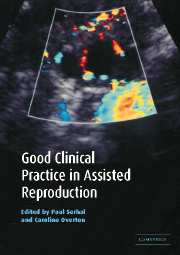Book contents
- Frontmatter
- Contents
- List of contributors
- Foreword by Bob Edwards
- Preface
- 1 Clinical assessment of the woman for assisted conception
- 2 Clinical assessment and management of the infertile man
- 3 Laboratory assessment of the infertile man
- 4 Donor insemination
- 5 Treatment options prior to IVF
- 6 Strategies for superovulation for IVF
- 7 Techniques for IVF
- 8 Ovarian hyperstimulation syndrome
- 9 Early pregnancy complications after assisted reproductive technology
- 10 Oocyte donation
- 11 Surrogacy
- 12 Clinical aspects of preimplantation genetic diagnosis
- 13 Controversial issues in assisted reproduction
- 14 Alternatives to in vitro fertilization: gamete intrafallopian transfer and zygote intrafallopian transfer
- 15 Counselling
- 16 Good nursing practice in assisted conception
- 17 Setting up an IVF unit
- 18 Information technology aspects of assisted conception
- 19 Assisted reproductive technology and older women
- 20 Ethical aspects of controversies in assisted reproductive technology
- Index
- Plate section
9 - Early pregnancy complications after assisted reproductive technology
Published online by Cambridge University Press: 22 October 2009
- Frontmatter
- Contents
- List of contributors
- Foreword by Bob Edwards
- Preface
- 1 Clinical assessment of the woman for assisted conception
- 2 Clinical assessment and management of the infertile man
- 3 Laboratory assessment of the infertile man
- 4 Donor insemination
- 5 Treatment options prior to IVF
- 6 Strategies for superovulation for IVF
- 7 Techniques for IVF
- 8 Ovarian hyperstimulation syndrome
- 9 Early pregnancy complications after assisted reproductive technology
- 10 Oocyte donation
- 11 Surrogacy
- 12 Clinical aspects of preimplantation genetic diagnosis
- 13 Controversial issues in assisted reproduction
- 14 Alternatives to in vitro fertilization: gamete intrafallopian transfer and zygote intrafallopian transfer
- 15 Counselling
- 16 Good nursing practice in assisted conception
- 17 Setting up an IVF unit
- 18 Information technology aspects of assisted conception
- 19 Assisted reproductive technology and older women
- 20 Ethical aspects of controversies in assisted reproductive technology
- Index
- Plate section
Summary
The availability of prenatal diagnosis has expanded, in particular with great advances in ultrasound imaging enabling investigation of the fetus from three weeks after conception. Because pregnancies resulting from assisted reproductive technology (ART) undergo regular ultrasound examination, often on a weekly basis, they have been an invaluable source of information on normal and abnormal human development in utero. For example, most measurement charts used in early pregnancy units have been constructed from the investigation of ART pregnancies.
Miscarriage is the most common complication of spontaneous and artificial gestations (Table 9.1). In cases of miscarriage the diagnosis of a specific anomaly has important epidemiological value and may help to elucidate unclear mechanisms implicated in some cases of early pregnancy loss (EPL). Because of the perceived need to stimulate excess follicles and transfer more than two embryos to achieve high pregnancy rates, multiple gestation pregnancy (MGP) rates are higher in ART cycles and because perinatal mortality rates are four to six times higher for MGP than singleton, MGP must be considered a serious complication of ART. This chapter presents the different aspects of early investigation and management of pregnancy failure and MGP, including sections on the clinical aspects of miscarriage, the ultrasound diagnosis of EPL and ectopic pregnancy, and the differential diagnosis between monozygotic and dizygotic twinning. The role of multifetal pregnancy reduction (MFPR) in the management of MGP resulting from ART is also discussed.
Clinicopathology and epidemiology of early pregnancy complications: definitions
Early pregnancy loss
This is defined as a miscarriage occurring within the first 12 weeks of gestation.
Keywords
- Type
- Chapter
- Information
- Good Clinical Practice in Assisted Reproduction , pp. 167 - 185Publisher: Cambridge University PressPrint publication year: 2004

